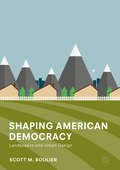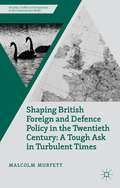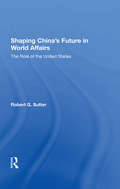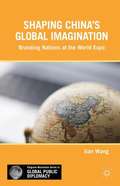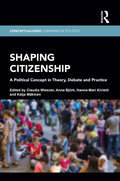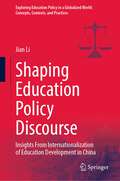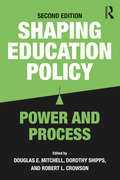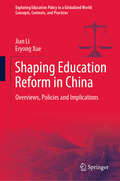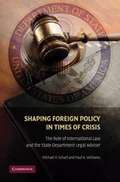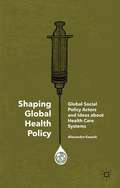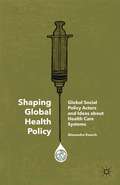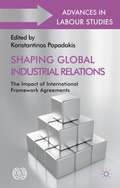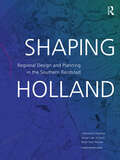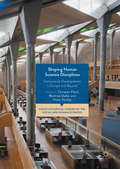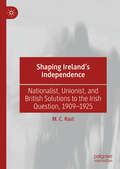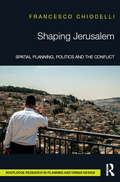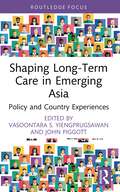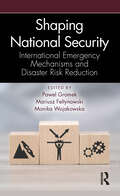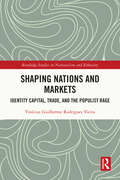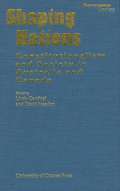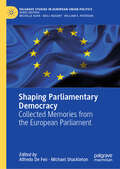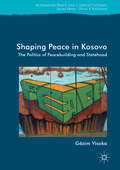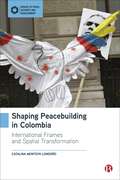- Table View
- List View
Shaper Nations: Strategies for a Changing World
by William I. Hitchcock Jeffrey W. LegroShaper Nations provides perspectives on the national strategies of eight countries that are shaping global politics in the twenty-first century. The volume's authors offer a unique viewpoint: they live and work primarily in the country about which they write, bringing an insider's feel for national debates and politics.
Shaping American Democracy: Landscapes and Urban Design
by Scott M. RoulierThis book argues that the design of built spaces influences civic attitudes, including prospects for social equality and integration, in America. Key American architects and planners--including Frederick Law Olmsted, Frank Lloyd Wright, Robert Moses, and the New Urbanists--not only articulated unique visions of democracy in their extensive writings, but also instantiated those ideas in physical form. Using criteria such as the formation of social capital, support for human capabilities, and environmental sustainability, the book argues that the designs most closely associated with a communally-inflected version of democracy, such as Olmsted's public parks or various New Urbanist projects, create conditions more favorable to human flourishing and more consistent with a democratic society than those that are individualistic in their orientation, such as urban modernism or most suburban forms.
Shaping British Foreign and Defence Policy in the Twentieth Century: A Tough Ask in Turbulent Times (Security, Conflict and Cooperation in the Contemporary World)
by Malcolm H. MurfettThis volume is devoted to the shaping of British foreign and defence policymaking in the twentieth century and illustrates why it's relatively easy for states to lose their way as they grope for a safe passage forward when confronted by mounting international crises and the antics of a few desperate men.
Shaping China's Future In World Affairs: The Role Of The United States
by Robert G SutterThis book considers Chinese foreign policy and China's future role in world affairs in the context of the country's recent past. Robert Sutter shows that although it appears to be in U.S. interests for post-Mao leaders to continue moving toward international norms, a post-Deng leadership backed by growing economic and military power and reflecting profound changes in China's economy and society could move in markedly different directions. Most foreign powers appear willing to accommodate China, avoiding actions that could prompt a sharp shift in Chinese foreign policy, but Sutter argues that current U.S. policy intrudes on so many issues that are particularly sensitive for Beijing and for China's future that it represents perhaps the most critical variable determining how China will position itself in world affairs. Concluding that there is no guarantee the United States will use this influence wisely, Sutter examines the uncertainty and unpredictability of U.S. foreign policy in the post-Cold War environment that work against the creation of an effective U.S. policy toward China.
Shaping China’s Global Imagination
by Jian WangThis book explores the concept of nation branding - what it is and how it works - through an instructive case of the 2010 World Expo in Shanghai, where 190 countries showcased their national cultures to a predominantly Chinese audience. The comparative analysis of national pavilions (including Brazil, India, Israel, South Africa, South Korea, Spain, the United Arab Emirates and the United States) demonstrates how a place-branding activity, such as the World Expo, facilitates communication to build a nation's image, thereby enhancing its soft power. As nation-branding efforts will only increase in the coming years, this study forms an important basis for future inquiry.
Shaping Citizenship: A Political Concept in Theory, Debate and Practice (Conceptualising Comparative Politics)
by Claudia Wiesner Anna Björk Hanna-Mari Kivistö Katja MäkinenCitizenship is a core concept for the social sciences, and citizenship is also frequently interpreted, challenged and contested in different political arenas. Shaping Citizenship explores how the concept is debated and contested, defined and redefined, used and constructed by different agents, at different times, and with regard to both theory and practice. The book uses a reflexive and constructivist perspective on the concept of citizenship that draws on the theory and methodology of conceptual history. This approach enables a panorama of politically important readings on citizenship that provide an interdisciplinary perspective and help to transcend narrow and simplified views on citizenship. The three parts of the book focus respectively on theories, debates and practices of citizenship. In the chapters, constructions and struggles related to citizenship are approached by experts from different fields. Thematically the chapters focus on political representation, migration, internationalization, sub-and transnationalization as well as the Europeanisation of citizenship. An indispensable read to scholars and students, Shaping Citizenship presents new ways to study the conceptual changes, struggles and debates related to core dimensions of this ever-evolving concept.
Shaping Education Policy Discourse: Insights From Internationalization of Education Development in China (Exploring Education Policy in a Globalized World: Concepts, Contexts, and Practices)
by Jian LiThis book provides key insights into conceptualizing and contextualizing the education policy discourse model from the perspective of the internationalization of education development in China. It discusses the education policy discourse of international education with Chinese characteristics. It comprehensively covers the internationalization of education development, including the macro-perspective on the internationalization of education development in China, the quest for internationalization at home post-COVID-19, international education development in China, and mapping study abroad policy development in China. This book also explores the strategies regarding advancing the internationalization of education development in China contextually and systematically. This is a highly informative and carefully presented book, providing academic insight for readers with an interest in international education policy in China.
Shaping Education Policy: Power and Process
by Douglas E. Mitchell Dorothy Shipps Robert L. CrowsonShaping Education Policy is a comprehensive overview of education politics and policy, which provides conceptual guideposts for future policy development and strategies for change. Leading scholars explore the interacting social processes and the dynamics of power politics as they intersect with democratic ideals and shape school performance. Chapters cover major themes that have influenced education, including the Civil Rights Movement, federal involvement, the accountability movement, family choice, and development of nationalization and globalization. This edited collection examines how education policy in the United States has evolved over the last several decades and how the resulting policies are affecting schools and the children who attend them. This important book is a necessary resource for understanding the evolution, current status, and possibilities of educational policy and politics.
Shaping Education Reform in China: Overviews, Policies and Implications (Exploring Education Policy in a Globalized World: Concepts, Contexts, and Practices)
by Jian Li Eryong XueThis book examines the ways education reform has been shaped in China. Focusing on the past education policy development, it offers unique perspectives to illustrate China’s education reform and provides an overview of policies and their implications. In addition, the book discusses educational development, educational value, educational efforts and educational tasks and explores physical, aesthetic and labor education, as well as the management of off-campus training institutions and the policies on abolishing the “Five Only” in contemporary China. Conceptualizing the education reform model in China since 1949 for the first time, the book maps Chinese education policy development.
Shaping Foreign Policy in Times of Crisis
by Michael P. Scharf Paul R. WilliamsShaping Foreign Policy in Times of Crisis grew out of a series of meetings that the authors convened with all ten of the living former U. S. State Department legal advisers (from the Carter administration to that of George W. Bush). Based on their insider accounts of the role that international law actually played during the major crises on their watch, the book explores whether international law is real law or just a form of politics that policymakers are free to ignore whenever they perceive it to be in their interest to do so. Written in a style that will appeal to the casual reader and serious scholar alike, the book includes a foreword by the Obama administration's State Department legal adviser, Harold Koh; background on the theoretical underpinnings of the compliance debate; an in-depth case study of the treatment of detainees in the war on terror; and a comprehensive glossary of the terms, names, places, and events that are discussed in the book.
Shaping Global Health Policy: Global Social Policy Actors and Ideas about Health Care Systems
by Alexandra KaaschUsing an approach that combines transnational and comparative social policy analysis with international relations, this book assesses various global social policy actors and compares their ideas and prescriptions about national health care systems. It highlights the importance of considering health policies across multiple scales.
Shaping Global Health Policy: Global Social Policy Actors and Ideas about Health Care Systems
by Alexandra KaaschUsing an approach that combines transnational and comparative social policy analysis with international relations, this book assesses various global social policy actors and compares their ideas and prescriptions about national health care systems. It highlights the importance of considering health policies across multiple scales.
Shaping Global Industrial Relations
by Konstantinos PapadakisIn recent years, many multinational enterprises have adopted corporate codes of conduct with social provisions. Increasingly, they are now signing international framework agreements (IFAs) with global unions representing workers by sector of activity. In addition to regulating labour management relations across global value chains, these agreements aim to promote compliance with the International Labour Organization's (ILO) core labour standards. Shaping Global Industrial Relations assesses the phenomenon of IFAs, examining their impact around the world as well as their effectiveness infostering labour-management dialogue. This book brings together the contributions of fifteen specialists, both academics and practitioners, covering the 80-plus IFAs that existed in July 2010. Particular attention is paid to the negotiation and implementation of IFAs, anda number of case studiesilluminate the managerial motivation behind the adoption of these agreements. Theauthorsevaluate theconsequences of IFAs andassesstheir potential as a model for cross-border industrial relations in the future. "
Shaping History
by Molly AndrewsFeaturing extraordinary personal accounts, this book provides a unique window through which to examine some of the great political changes of our time, and reveals both the potential and the challenge of narrating the political world. Molly Andrews' novel analysis of the relationship between history and biography presents in-depth case studies of four different countries, offers insights into controversial issues such as the explosion of patriotism in post -9/11 USA; East Germans' ambivalent reactions to the fall of the Berlin Wall; the pressures on victims to tell certain kinds of stories while testifying before South Africa's Truth and Reconciliation Commission; and the lifelong commitment to fight for social justice in England. Each of the case studies explores the implicit political worldviews which individuals impart through the stories they tell about their lives, as well as the wider social and political context which makes some stories more 'tell-able' than others.
Shaping Holland: Regional Design and Planning in the Southern Randstad
by Jeroen van Schaick Francisco Colombo Peter WitsenAll around the world, regions are facing major challenges: climate change, the transition to renewable energy, reinventing the food system, ongoing urbanisation and finding room to sustain biodiversity. These will radically transform our living and working environments. Regional design uses the power of visualisation to unite regional players around appealing spatial development visions for meeting those challenges. It offers a route to new forms of regional governance and planning that match the urgencies of our time. This book exposes the benefits and the pitfalls of regional plans and designs. Shaping Holland gives a unique insight into the emergence of contemporary regional planning and design practice in the Netherlands. This densely populated country in the delta of the Rhine and Meuse rivers is internationally renowned for its urban planning and design tradition. Drawing on first-hand accounts and a rich collection of illustrations, maps and diagrams, the book gives pointers for practitioners, academics and students of spatial planning, urban design and landscape architecture. Regional design is on the rise in all continents. It provides an answer to a world in which economic activities, activity patterns, urban growth and ecological systems are no respecters of administrative boundaries. Amid the growing number of academic analyses of regional design, this book is unique because it focuses on planning practice and first-hand knowledge. As such it is of interest to a broad international readership.
Shaping Human Science Disciplines: Institutional Developments in Europe and Beyond (Socio-Historical Studies of the Social and Human Sciences)
by Christian Fleck Matthias Duller Victor KarádyThis book presents an analysis of the institutional development of selected social science and humanities (SSH) disciplines in Argentina, France, Germany, Hungary, Italy, the Netherlands, Sweden and the United Kingdom. Where most narratives of a scholarly past are presented as a succession of ‘ideas,’ research results and theories, this collection highlights the structural shifts in the systems of higher education, as well as institutions of research and innovation (beyond the universities) within which these disciplines have developed. This institutional perspective will facilitate systematic comparisons between developments in various disciplines and countries. Across eight country studies the book reveals remarkably different dynamics of disciplinary growth between countries, as well as important interdisciplinary differences within countries. In addition, instances of institutional contractions and downturns and veritable breaks of continuity under authoritarian political regimes can be observed, which are almost totally absent from narratives of individual disciplinary histories. This important work will provide a valuable resource to scholars of disciplinary history, the history of ideas, the sociology of education and of scientific knowledge.
Shaping Ireland’s Independence: Nationalist, Unionist, and British Solutions to the Irish Question, 1909–1925
by M. C. RastThis book explores the political and ideological developments that resulted in the establishment of two separate states on the island of Ireland: the Irish Free State and Northern Ireland. It examines how this radical transformation took place, including how British Liberals and Unionists were as influential in the “two-state solution” as any Irish party. The book analyzes transformative events including the third home rule crisis, partition and the creation of Northern Ireland, and the Irish Free State’s establishment through the Anglo-Irish Treaty. The policies and priorities of major figures such as H.H. Asquith, David Lloyd George, John Redmond, Eamon de Valera, Edward Carson, and James Craig receive prominent attention, as do lesser-known events and organizations like the Irish Convention and Irish Dominion League. The work outlines many possible solutions to Britain’s “Irish question,” and discusses why some settlement ideas were adopted and others discarded. Analyzing public discourse and archival sources, this monograph offers new perspectives on the Irish Revolution, highlighting in particular the tension between public rhetoric and private opinion.
Shaping Jerusalem: Spatial planning, politics and the conflict
by Francesco ChiodelliShaping Jerusalem: Spatial planning, politics and the conflict focuses on a hidden facet of the Israeli-Palestinian conflict; the relentless reshaping of the Holy City by the Israeli authorities through urban policies, spatial plans, infrastructural and architectural projects, land use and building regulations. From a political point of view, the Israeli-Palestinian conflict may appear to be at an impasse; however, it is precisely by looking at the city’s physical space that one can perceive that a war of cement and stone is under way. Many books have been written on the Israeli-Palestinian conflict over Jerusalem; some of them have focused on the urban fabric; Shaping Jerusalem uniquely discusses the role of Israeli spatial actions within the conflict. It argues that Israel’s main political objective – control over the whole city – is ordinarily and silently pursued through physical devices which permanently modify the territory and the urban fabric. Relying on strong empirical evidence and data through the analysis of statistical data, official policies, urban projects, and laws, author Francesco Chiodelli substantiates the political discussion with facts and figures about the current territorial situation of the city, and about the Israeli policies implemented in the city in the past six decades.
Shaping Long-Term Care in Emerging Asia: Policy and Country Experiences (Routledge Advances in Asia-Pacific Studies)
by Vasoontara Sbirakos YiengprugsawanCountries are facing increasing life expectancy and a shrinking family size and in effect, this may escalate demands for medical and supportive services. The role of families in providing informal care will remain important. However, the simultaneous decline in the supply of informal caregiving caused by changes in family structure and higher female labour-market participation necessitate the expansion of the public role in care provision. This book analyses the challenges of long-term care (LTC) policy development and implications from advanced LTC systems and a current trajectory in emerging economies in Asia. The book approaches the subject through comparative analysis on what works and what does not to provide insight into public policy options for sustainable LTC provision and financing mechanisms. How the countries adopt different approaches to health and social systems towards LTC development could provide important insight and perspectives into policy options in the region. This book aims at academics, policymakers and practitioners in health, social, and aged care services and could also be used as a teaching resource for undergraduate students in health and social sciences and postgraduate programs in public health, epidemiology, social demography, gerontology, and nursing. The book will be of interest to a wider audience not only on social and health consequences of population ageing but also health and social policy relating to older persons.
Shaping National Security: International Emergency Mechanisms and Disaster Risk Reduction
by Pawel Gromek Mariusz Feltynowski Monika WojakowskaShaping National Security: International Emergency Mechanisms and Disaster Risk Reduction presents international emergency mechanisms relative to disaster risk reduction (DRR). The goal is to share knowledge about existing frameworks, and utilize established DRR policies and programs, as another means to reinforce and strengthen national security in countries around the world. The book outlines, in detail, the United Nations Disaster Assessment and Coordination (UNDAC), the International Search and Rescue Advisory Group (INSARAG), the North Atlantic Treaty Organisation (NATO) and the Union Civil Protection Mechanism (UCPM) DRR programs. While these entities’ versions of DRR best practices are largely directed at decreasing the impact of disaster hazards, limiting relevant exposure, local vulnerabilities, increasing capacities to cope with disaster, the authors present these frameworks as potential tools, and effective means, to support national security efforts. This is especially important in disaster circumstances when local, and national emergency resources, may be insufficient to face hazards and multi-hazards, and result in cascading effects to occur as hazard events transpire. Chapters present various resources available to them, through these programs, to encourage authorities from every country to effectively apply the mechanisms—and emergency mechanisms specifically—to offer domestic solutions. Due to these programs proven track records in providing organisational standards, the use of such mechanisms can serve as both the basis to foster sound DRR practices and, by extension, can supplement resiliency, security, and continuity within countries. This concept is based on the premise that the UNDAC, INSARAG, NATO and ECPM emergency mechanisms have been developed to be implementable (directly or indirectly) in every country in the world when disasters occur. Shaping National Security takes a "big-picture," holistic view of DRR and national security to offer innovative ideas and solutions to professionals and officials working in disaster management, disaster risk reduction, emergency management, crisis management, civil protection, public security management, national security, criminal justice, international studies, and homeland security.
Shaping Nations and Markets: Identity Capital, Trade, and the Populist Rage (Routledge Studies in Nationalism and Ethnicity)
by Vinícius Guilherme Rodrigues VieiraShaping Nations and Markets employs a mixed methods approach to contend that economic ideas, organization of domestic interests and their economic power, asymmetries of information, and political institutions do not sufficiently explain the formation of national interests in processes of trade liberalization. The author proposes that something is missing—identity capital—which also empowers economic sectors that share either liberalizing or protectionist interests. Identity capital is an economic sector’s contribution to the stability of a national identity narrative; it correlates with the degree to which the workforce of any sector represents the dominant conception of national identity. Identity capital creates political power asymmetries among those sectors and impacts the formation of populist movements in both developed and developing states. This book offers a theoretical framework to unpack national identity, trade liberalization, nationalist-populism, domestic politics, and globalization. The author argues that the key for identifying whether liberalizing or protectionist coalitions prevail in trade negotiations is identity capital. He offers a comparison of the three largest contemporary, federal, multicultural democracies: Brazil, India, and the United States, from the Doha Development Round of the World Trade Organization (WTO) in 2001, to the rise of populism in these countries in recent years. This book will be of great interest to graduate students and scholars of international relations, international studies, political science, comparative politics, and economic sociology.
Shaping Nations: Constitutionalism and Society in Australia and Canada
by Linda Cardinal David HeadonShaping Nations brings together the work of Australian and Canadian scholars around five core themes: constitutionalism, colonialism, republicanism, national identity, and governance.
Shaping Parliamentary Democracy: Collected Memories from the European Parliament (Palgrave Studies in European Union Politics)
by Alfredo De Feo Michael ShackletonThis book analyses nearly 100 original interviews with Members of the European Parliament from across the European Union who were active between 1979 and 2019. These interviews, preserved in the Historical Archives of the European Union at the European University Institute, capture the memories of the MEPs about their own roles and their assessment of what the parliament achieved in developing a European parliamentary democracy in the forty years following the first direct elections. The book offers a taste of the interviews in ten chapters, each of which corresponds to a specific theme presented in the archive: choosing the parliament, working inside the parliament machine, living inside the political groups, playing a part in major moments, influencing and shaping policy, scrutinizing and holding to account, making a mark beyond the EU, communicating the work of the parliament, keeping in touch with national societies, and looking to the future.
Shaping Peace in Kosovo: The Politics of Peacebuilding and Statehood (Rethinking Peace and Conflict Studies)
by Gëzim VisokaThis book explores the prospects and limits of international intervention in building peace and creating a new state in an ethnically divided society and fragmented international order. The book offers a critical account of the international missions in Kosovo and traces the effectiveness of fluid forms of interventionism. It also explores the co-optation of peace by ethno-nationalist groups and explores how their contradictory perception of peace produced an ungovernable peace, which has been manifested with intractable ethnic antagonisms, state capture, and ignorance of the root causes, drivers, and consequences of the conflict. Under these conditions, prospects for emancipatory peace have not come from external actors, ethno-nationalist elite, and critical resistance movements, but from local and everyday acts of peace formation and agnostic forms for reconciliation. The book proposes an emancipatory agenda for peace in Kosovo embedded on post-ethnic politics and joint commitments to peace, a comprehensive agenda for reconciliation, people-centred security, and peace-enabling external assistance.
Shaping Peacebuilding in Colombia: International Frames and Spatial Transformation
by Catalina Montoya LondoñoDuring the second half of the 20th century, Colombia suffered extreme levels of political violence. This book explores the involvement of the international community in peacebuilding efforts in Colombia since 2016. In particular, it examines how interventions were framed in order to promote and sustain their involvement and questions whether these frames reflected reality within Colombia. The book focuses on key donors, including the US, the EU, Canada, Sweden and the UK, as well as multinational actors, such as the UN and the World Bank, to demonstrate how their framing of local issues for national and international consumption can have real world implications for peacebuilding efforts on the ground.

